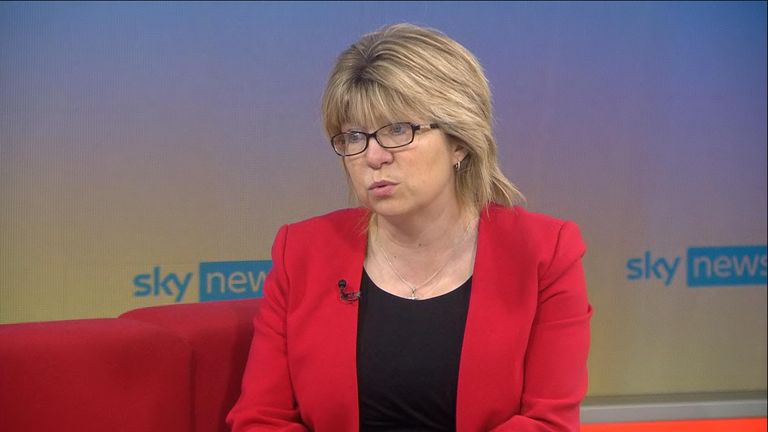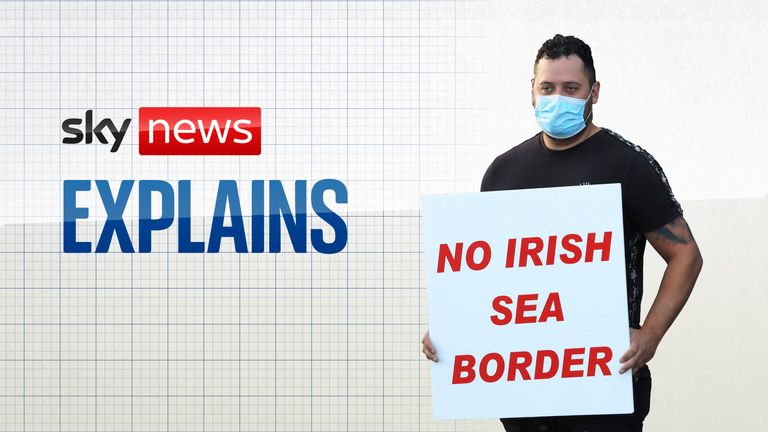A minister has played down the suggestion a Brexit deal on Northern Ireland can be struck this week as Rishi Sunak faces a fresh split among Tories.
Maria Caulfield told Sky News the prime minister is still trying to fix problems with the contentious Northern Ireland Protocol, amid signs of a possible Tory rebellion.
Asked about the prospect of a breakthrough this week, she said: “I don’t know about this week, I know that the prime minister is working really hard and working with a number of politicians from across Northern Ireland, politicians within the EU, to try and resolve this.”
Politics live: Sunak meeting with cabinet as talks on NI deal continue
Later on Times Radio, she urged Conservative colleagues to give the prime minister time to secure a revised agreement.
“There isn’t a deal done yet so all these rumours about ministers or MPs not being happy, I haven’t seen the details, we have to give the prime minister that time and space to get these negotiations done,” she said.
“We need to give him the time and space to thrash out the final elements of any final deal.”
Prominent Eurosceptic Jacob Rees-Mogg had earlier compared Mr Sunak’s approach to that followed by his doomed predecessor Theresa May.
He said it was “very similar to what happened” with the former prime minister, where a policy would be presented in the hope that people would “conveniently fall in behind” it.
“Life doesn’t work like that. It’s important to get support for it first before you finalise the details and that doesn’t seem to have been done here,” he said on his ConservativeHome podcast.
Mr Sunak is understood to be discussing ways to reduce red tape on goods passing between Northern Ireland and the rest of the UK, as well as some sort of compromise on the so-called “democratic deficit” caused by NI still being subject to some EU rules so that goods can move freely into the Republic of Ireland.
But Mr Rees-Mogg suggested the PM should press ahead with the controversial Northern Ireland Protocol Bill, effectively ripping up parts of the agreement with Brussels, rather than seeking a deal which may not guarantee the return of a power-sharing executive in Stormont.
The former cabinet minister said: “There seems to me to be no point in agreeing a deal that does not restore power-sharing.
“That must be the objective. If it doesn’t achieve that objective, I don’t understand why the government is spending political capital on something that won’t ultimately succeed.”
He said the Northern Ireland Protocol Bill (NIPB) had the support of “the person who had a mandate from the British voters” – Boris Johnson.
Northern Ireland Protocol bill ‘no longer legally justified’
However former justice secretary Sir Robert Buckland, who served under Mr Johnson and previously backed the bill, said it is no longer legally justified.
Writing in The House Magazine, he said the bill was introduced when it seemed the “stalemate” with Brussels “would never end” but “things have changed dramatically since mid-2022”.
“The Northern Ireland Protocol Bill has outlived its political usefulness and no longer has any legal justification. It is the proverbial dead letter,” he wrote.
The intervention on Tuesday came after Mr Johnson called on the government to press on with the legislation enabling it to override parts of the protocol without the EU’s permission.
Some have interpreted words from Home Secretary Suella Braverman as support for the former prime minister’s position.
She described the bill as “one of the biggest tools that we have in solving the problem on the Irish Sea”.
What are the issues with the Northern Ireland Protocol?
The NIPB, dubbed by the EU as “illegal and unrealistic”, was introduced by Mr Johnson but paused by Mr Sunak while he tries to resolve issues with the protocol through negotiations.
The mechanism was put in place after Brexit to avoid a hard border on the island of Ireland, which all sides agreed was necessary to preserve peace.
But unionists are unhappy with the trade barriers the protocol has created on goods moving between Northern Ireland and the rest of the UK and believe the arrangement is threatening NI’s place in the union.
There is also anger over the role played by the European Court of Justice (ECJ) to oversee trade rules – which the DUP and some Conservative MPs see as an erosion of the UK’s sovereignty and incompatible with the aims of Brexit.
Read more:
What is the Northern Ireland Protocol and why does it matter?
What is the Brexit deal being discussed between UK and EU?
Mr Sunak held a cabinet meeting on Tuesday amid growing anticipation that the UK and the EU could be on the verge of agreeing on a new deal.
He has also been meeting with Conservative MPs in Downing Street to discuss the planned changes, including key Brexiteers, Sky News understands.
The PM is facing a potential battle with members of his own party as he seeks to satisfy the demands of both Conservative MPs and Northern Ireland’s Democratic Unionist Party (DUP), who have warned the breakup of the UK “is at stake”.
As pressure builds on Mr Sunak, The Times newspaper reported that some ministers could be prepared to resign if his solution to the protocol risks the place of Northern Ireland within the UK.
Number 10 has remained tight-lipped about what is being discussed with Brussels, but a source said that central to Mr Sunak’s focus was safeguarding Northern Ireland’s place in the union.
On Tuesday, Downing Street said “long-lasting challenges” over the protocol still need to be addressed but “progress” has been made with the EU.
Foreign Secretary James Cleverly and Northern Ireland Secretary Chris Heaton-Harris will hold fresh video talks with the EU’s Maros Sefcovic today to take stock of ongoing work on the protocol.
Sir Keir Starmer has urged the prime minister to allow the Commons to have its say on any final deal, offering Labour support to secure the approval of any new agreement in the event of any Tory rebellion.
There are hopes that a fresh settlement on post-Brexit arrangements in Northern Ireland will be able to secure the return of power-sharing at the Stormont Assembly, after the DUP walked out in protest over the protocol last February.








